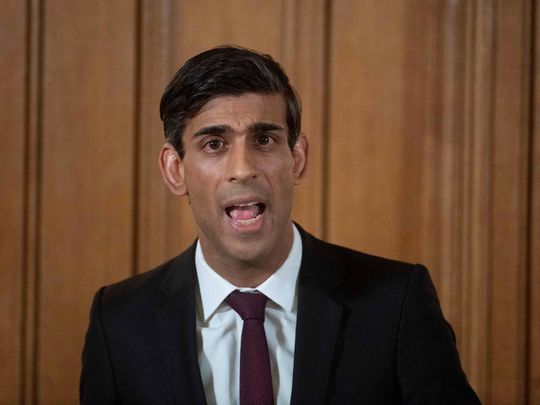
London: UK finance minister Rishi Sunak announced a costly extension of his emergency aid programmes to see Britain’s economy through its current coronavirus lockdown, but announced a tax hike for many businesses as he began to focus on fixing the public finances.
Delivering an annual budget speech on Wednesday, Sunak said the economy will regain its pre-pandemic size in the middle of 2022, six months earlier than previously forecast, helped by Europe’s fastest COVID-19 vaccination programme.
But it will remain 3 per cent smaller in five years’ time than it would have been without the damage wrought by the coronavirus crisis and extra support is needed now as the country remains under coronavirus restrictions, he said.
New COVID support
Among the new support measures was a five-month extension of his huge jobs rescue plan and more help for the self-employed, the continuation of an emergency increase in welfare payments, and an extension of a VAT cut for the hospitality sector.
A tax cut for home-buyers was also extended until the end of June.
“First, we will continue doing whatever it takes to support the British people and businesses through this moment of crisis,” Sunak told parliament.
“Second, once we are on the way to recovery, we will need to begin fixing the public finances “ and I want to be honest today about our plans to do that. And, third, in today’s Budget we begin the work of building our future economy.” Announcing forecasts by the Office for Budgetary Responsibility (OBR), Sunak said the economy was likely to grow by 4 per cent in 2021, slower than a forecast of 5.5 per cent made in November, reflecting the current lockdown which began in January.
Finance minister Rishi Sunak, a Conservative unveiling the first corporation tax rise since Labour raised it 1974, said the future tax hikes on companies were a fair way to start recouping the cost of vast state support to business during the pandemic.
"The government is providing businesses with over 100 billion pounds of support to get through this pandemic so it is fair and necessary to ask them to contribute to our recovery," Sunak told parliament.
"Even after this change, the United Kingdom will still have the lowest corporation tax rate in the G7," Sunak said.
The corporation tax rise - by far the biggest tax increase announced by Sunak in the budget - will take effect from 2023, when the economy is expected to regain its pre-pandemic size.
The measure is forecast to raise 11.9 billion pounds in the 2023-2024 tax year, rising to 17.2 billion pounds in 2025-26.
In the meantime, Sunak announced a measure to encourage businesses to invest their cash reserves in new machinery and plants, with a so-called "super deduction" that let businesses reduce their tax bills by 130% of the cost of investments. The measure is forecast to give businesses back around 12.3 billion pounds this coming year and 12.7 billion pounds in the next.
Still, the Confederation of British Industry, the lobby group for big British companies, said the hike in corporation tax was sending a worrying signal to investors.
"Moving corporation tax to 25% in one leap will cause a sharp intake of breath for many businesses and sends a worrying signal to those planning to invest in the UK," CBI Director-General Tony Danker said.
The United Kingdom introduced corporation tax at a rate of 40% in 1965. It rose to a high of 52% in the early 1970s and has been cut ever since. It was trimmed to 19% from 2017 and plans to cut it further were scrapped.
Law firm Clifford Chance said the hike in corporation tax - which in Britain is particularly broad with fewer deductions than elsewhere - would make the effective rate higher than that of Germany or the United States and on a level with France.
Britain would pass Sweden, Denmark, Israel, Ireland and Portugal in corporation tax revenue as a share of national income.
Sunak said small businesses with profits of less than 50,000 pounds a year would be charged only 19%, meaning around 70% of businesses would be unaffected, and a taper would mean only those with profits above 250,000 pounds - around 10% of companies - would be taxed at the full 25% rate.
Looking further ahead, the OBR forecast gross domestic product would grow 7.3 per cent, 1.7 per cent and 1.6 per cent in 2022, 2023 and 2024 respectively. In November, the OBR had forecast growth in those years of 6.6 per cent, 2.3 per cent and 1.7 per cent.
Whatever it takes
Sunak promised to do “whatever it takes” to steer the economy through what he hopes will be the final months of pandemic restrictions.
He has already racked up Britain’s highest borrowing since World War Two, which hit an estimated 17 per cent of GDP in the 2020/21 financial year that is about to end and should fall to a still historically high 10.3 per cent in 2021/22.
In a first move to raise taxes, Sunak announced he would raise corporation tax to 25 per cent from 19 per cent from 2023, by which time the economy should be past the pandemic crisis.
“Even after this change the UK will still have the lowest corporation tax rate in the G7 “ lower than the United States, Canada, Italy, Japan, Germany and France,” he said.
Businesses with profits of 50,000 pounds or less would pay a new Small Profits Rate, maintained at the current rate of 19 per cent.
Sunak also said he would freeze the amount of money that people can earn tax-free and the threshold for the higher rate of income tax until 2026.








